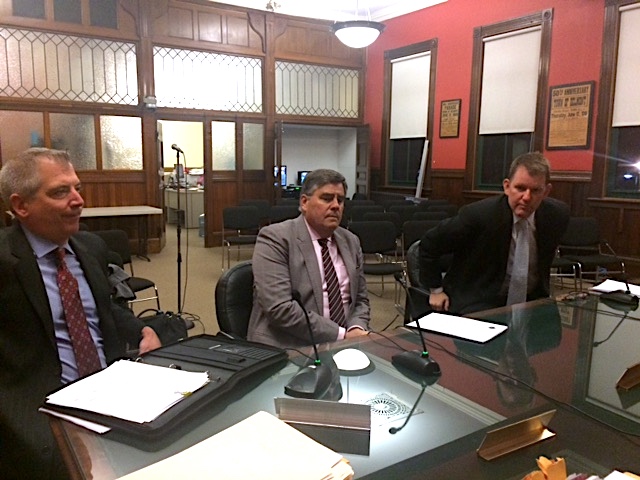Photo: Daniel Dargon, Robert Reardon and Charles Laverty III
There was a time in Belmont when the statement: “Your house looks like a million!” was metaphoric and not literal.
Not anymore, as the average assessed property in the “Town of Homes” had broken the seven-figure barrier, according to Board of Assessors when it announced the numbers during the annual tax classification hearing before the Belmont Board of Selectmen on Monday, Dec. 11.
The new “average” assessed value is $1,003,750, an increase from $942,000, according to Robert Reardon, long-time chair of the Board of Assessors, who announced that Belmont’s fiscal ’18 tax rate is set at $12.15 per $1,000 assessed value, a decrease of 4.25 percent from the fiscal ’17 rate of $12.69 per $1,000.
But don’t expect your quarterly bill to shrink in the coming year as the assessed value of property in Belmont shot up a healthy seven percent to $7.3 billion from $6.7 billion in fiscal ’17. With property values increasing at its highest percentage in more than five years, the average property owner will see their tax bill increase by 3.5 percent.
For example, the annual tax bill on the average assessed valued property ($1,003,750 x $12.15) will be $12,195.56 in fiscal ’18; an increase of $241.58 from last year’s bill of $11,953.98.
Under the new rate, Belmont will collect $86.1 million from residential, commercial, open land and personal properties. Last fiscal year, the town raised $82 million in real estate taxes.
Reardon noted a “big” increase in new property growth totaling $2,020,408, compared to the $788,000 in fiscal ’17. On top of the existing Belmont tax base of $567,550, the Uplands development on the Cambridge border that selling units at a better than expected rate and new construction on the site is underway providing the town $600,750, nearly $200,000 more than anticipated. The completion of the electrical substation and its sale to Eversourse (the former NSTAR) brought in $852,108 in one-time funds to new growth.
As with past years, the assessors’ recommended, and the selectmen agreed to a single tax classification for all properties and no real estate exemptions.
Reardon said Belmont does not have anywhere near the amount of commercial and industrial space – at a minimum 20 percent – to creating separate tax rates for residential and commercial properties. Belmont’s commercial base is 4.1 percent of the total real estate.
“People always assumes there’s money if you go with the split rate and that’s not true,” Reardon told the Belmontonian.








Just in time for the new Republican tax plan capping SALT deductions.
Good for Belmont. Get all the older follks out of town to get all the old people OUT. Belmont only wants RICH people to support the commercial less over priced wealthy homes.
Thanks from a long term 65+ year old citizen.